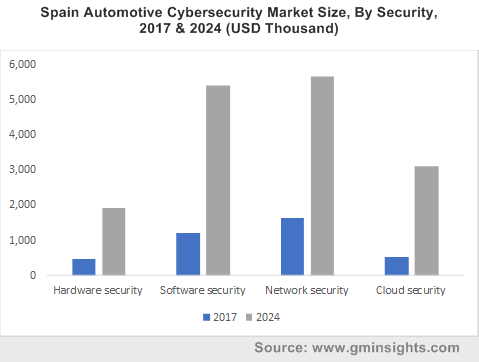Automotive cyber security market to witness an impressive 23.5% CAGR over 2018-2024, securing of ECUs and network services to be the key growth driving factor
Publisher : Fractovia | Published Date : 2018-08-02Request Sample
The unparalleled reach of internet connectivity across the globe has facilitated the expansion of the automotive cyber security market to ensure the physical safety and data security of vehicle users. Cyber-attacks are becoming more frequent with growing number of connected devices and increase in information technology skill base. Vehicles are embedded with over a hundred electronic controllers along with various external connecting technologies like Bluetooth, GSM, dedicated short range communication and Wi-Fi, rendering them susceptible to unauthorized access from outside. Consequently, safety and satisfaction of customers are the top most concerns of auto manufacturers, and connected vehicles are being subject to relentless observation and protection, bringing the automotive cyber security industry into focus as a critical factor in developing future-ready automobiles.
Spain Automotive Cybersecurity Market Size, By Security, 2017 & 2024 (USD Thousand)

The compulsion of connected services in vehicles for offering features like improved comfort, convenience, road safety and assisted parking will greatly benefit the automotive cyber security market, which apportioned revenues of over USD 187 million in 2017. With the mounting probability of a vehicle being hacked, a number of IT companies are partnering with automakers to develop security features and enhance the vehicle safety measures. The automotive cyber security industry caters to every type of vehicle, from average passenger and luxury cars to heavy duty trucks. Estimates suggest that close to 70 million connected vehicles will be running on the roads by 2020, a significant surge in comparison with the 2016 figure of 28 million. These statistics represent the vast amount of electronic control units (ECUs) that would be required in order to enhance the vehicles, instigating the automotive cybersecurity market.
Technically, ECUs regulate and monitor vehicle performance, safety features, entertainment systems and the overall state of a vehicle and its occupants, while enabling connectivity with external networks. The number of ECUs in a car may range from 70 to over 150 depending on the vehicle type, denoting the vulnerability of connected vehicles to hacking and the significance of the automotive cyber security industry for protecting them. Increased efforts by industry experts to spread the awareness regarding ECU in connected vehicles and how they could be hacked has not only made people cautious but also brought out various companies to develop security solutions.
Argus, a leading name in the automotive cyber security market, provides verified ECU protection for ECUs specific to critical vehicle components such as brakes, door control units, advanced driver assistance units, among others. The protection is designed for detecting and countering threats originating from internal as well as external sources, by guarding against receiving or sending of non-compliant communications that are aligned against the ECU functionality. Argus ECU protection has just a small footprint, making it a non-intrusive technology and capable of supporting almost any ECU.
A key feature of Argus’s protection system is that besides shielding from incoming cyberattacks, it also stops ECUs that are compromised from attacking the connected network. As this network consists of outside services and other vehicles connected through the same platform, a breach in the security could cause widespread communication errors effected by cybercriminals. The advent of the automotive cyber security market is crucial in eliminating personal losses occurring when malicious hackers gain access to a vehicles system, causing incorrect data to be displayed on the instruments, turning off exterior or interior lights, locking/ unlocking all doors and also disabling the brake systems completely.
The National Highway Traffic Safety Administration (NHTSA) of the U.S., believes that connectivity between vehicles is essential for utilizing the full benefits of network automation technologies and the automotive cyber security industry can assist in developing smarter and safer on-road capabilities. According to NHTSA estimates the application of Left Turn Assist (LTA) and Intersection Movement Assist (IMA), two important safety features in connected cars, could avert almost 592,000 crashes and save nearly 1,083 lives of U.S. citizens every year. Both are vital vehicle-to-vehicle network technologies, as LTA warns drivers to not take a left turn in front of an oncoming vehicle from opposite direction and IMA lets them know if it is safe to enter an intersection, depending on the probability of collisions between one of more vehicles.
With such safety applications being decisive in the development and acceptance of connected vehicles worldwide, the automotive cybersecurity industry is of paramount importance in safeguarding the lives and private information of motorists. The connected services allow for additional technologies to be implemented in vehicles, such as helping to avoid imminent forward collision, detect blind spots and give stop light warnings. Since the number of safety, comfort and network connectivity features incorporated in vehicles is expected to go on accruing, the automotive cyber security market is will witness a tremendous growth and is poised to achieve a CAGR of more than 23.5% from 2018 to 2024.